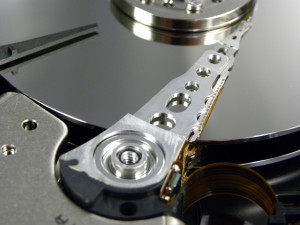Recently, we had a client ask whether data has a physical weight. This isn’t a bad question — although if you understand the basics of magnetic data storage, there’s an obvious answer.
A hard drive filled with terabytes of data weighs exactly the same as a completely empty hard drive (assuming that both drives are the same model). Hard drive data has no weight; it’s simply a series of magnetic properties.
Hard drives store data magnetically, but magnetic domains don’t affect weight.
 If you’re having trouble with that concept, this might be helpful: Hard drives work by passing read/write heads across platters coated in a thin magnetic material. The platters spin while the heads do their work, creating a thin cushion of air that allows the heads to float just above the surface of the magnetized material.
If you’re having trouble with that concept, this might be helpful: Hard drives work by passing read/write heads across platters coated in a thin magnetic material. The platters spin while the heads do their work, creating a thin cushion of air that allows the heads to float just above the surface of the magnetized material.
The read/write heads write data in binary: 0s are indicated by magnetic North charges, and 1s as magnetic South charges. When you get your new hard drive (and hopefully, it’s actually brand new), it still has magnetic charge. It’s just not readable as data.
The bottom line: Even if a hard drive is packed with all 1s or all 0s, it still weighs the same. Magnetism can affect mass, the quality of matter to resist movement, but only by a miniscule amount; it doesn’t affect weight.
Related: Does a Hard Drive Work in Outer Space?
But what about the side effects of writing data?
Here’s where things get more interesting: As a hard drive operates, it heats up. Energy and mass are equivalent, so if a hard drive is operating, it technically weighs slightly more than a hard drive that isn’t operating.
But any weight change is very, very small (and we’re not sure how to measure it).
What about solid-state storage?
Solid-state storage (including flash drives, solid-state drives, and other electronic devices) write data with electrical charges — not magnetism. And electricity has a weight, even if it’s quite small.
Veteran tech writer Fred Langa has calculated the exact weight of flash data in a fascinating article (well, fascinating to us). Here’s a quick excerpt:
“…you have to make assumptions about how many electrons constitute a useful charge-state for whatever device you’re talking about, but one calculation says that 1GB of flash memory completely filled with 1s weighs something like 729 femtograms more than the same memory filled with zeros.”
A femtogram is 0.000000000000001 kg, so while a full SSD weighs more than an empty SSD, you won’t be able to notice the difference.
Related: Can Static Electricity Really Destroy a Hard Drive?
Datarecovery.com is a world leader in professional data services.
With real data recovery laboratories at every location, we provide a reliable resource for recovering hard drives, SSDs, RAID arrays, and all other storage devices and systems. Thankfully, we don’t charge by the femtogram.
Our services feature a no data, no charge guarantee: If we can’t recover the files you identify as important, you don’t pay for the attempt. To schedule a risk free evaluation, submit a case online or call 1-800-237-4200 to speak with an expert.





